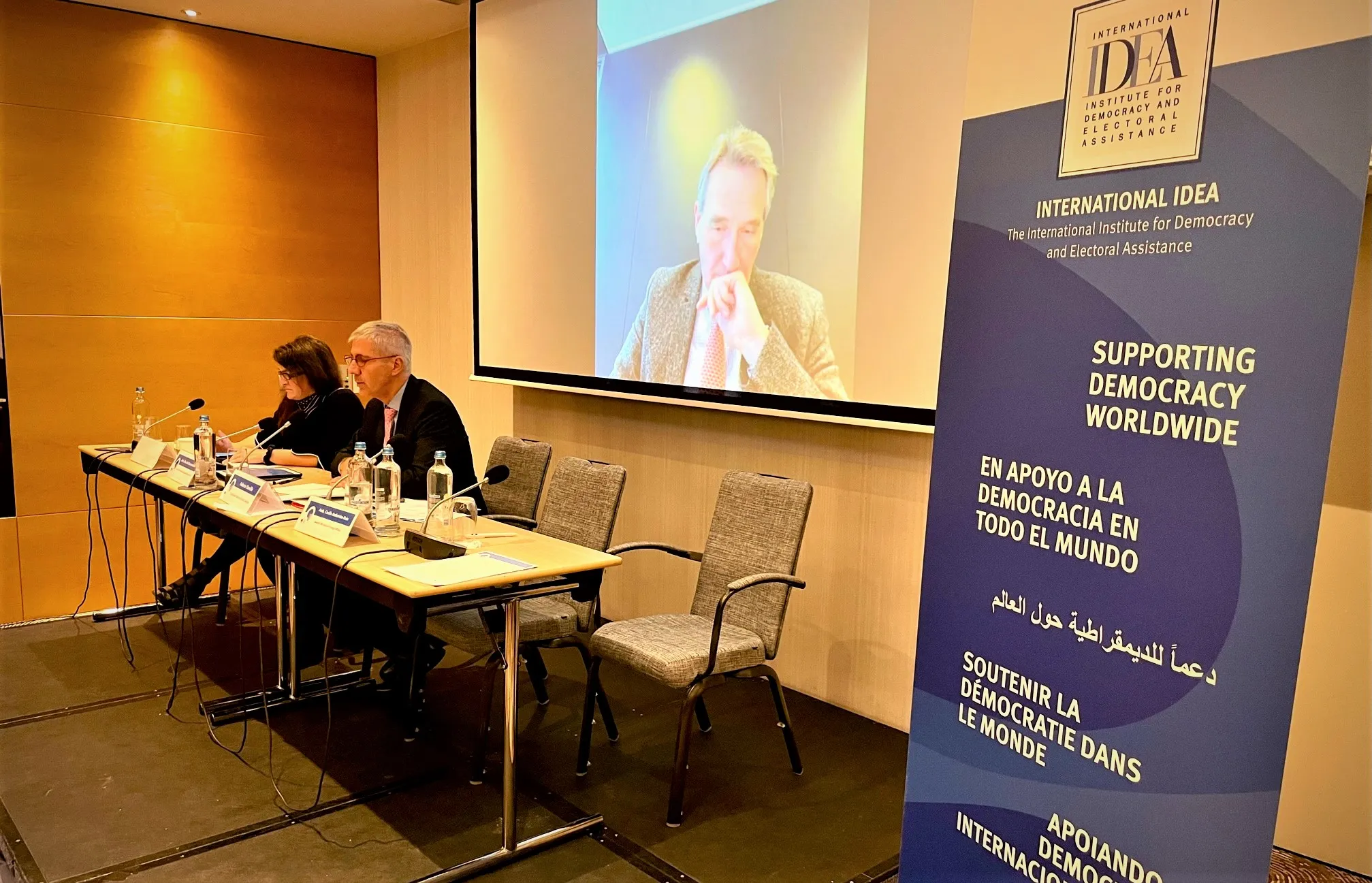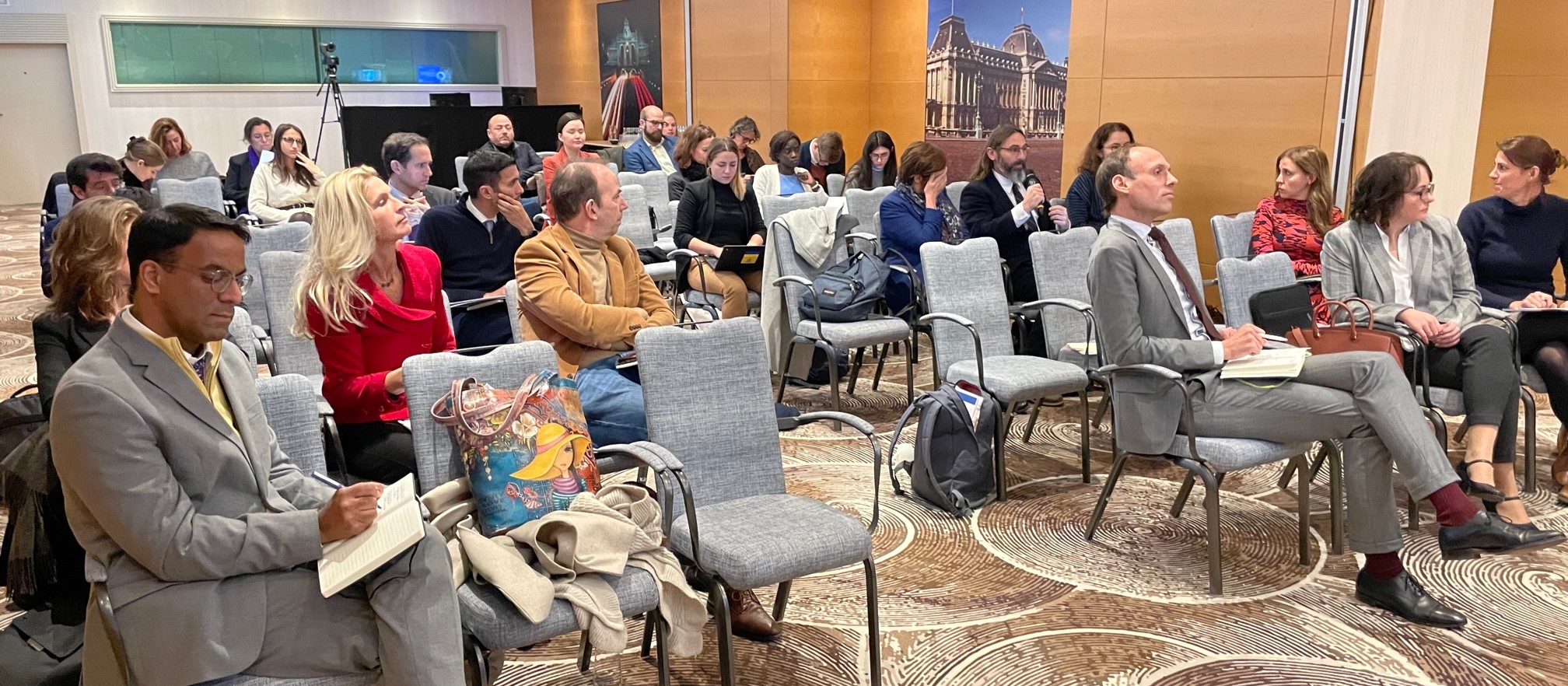Summit for Democracy Year of Action Dialogue: Beyond the Summit for Democracy, opportunities and the way forward

International IDEA and the European Commission co-hosted a hybrid event on 13 December 2022, ‘Beyond the Summit for Democracy, opportunities and the way forward’. The first Summit for Democracy (S4D) and Year of Action put the spotlight on democracy at a critical time, it engaged leaders to formulate domestic and external commitments on democracy and human rights.
This event sought to clarify the opportunities created by the S4D process. It consisted of three sessions: ‘Embracing the opportunities of the S4D process’, ‘Ensuring the continuity of the S4D process beyond the S4D’ and ‘Assessing the modalities and achievements of the democracy cohorts’.
The panels firstly allowed for governments, civil society and other relevant stakeholders to take stock on the good practices of the Summit for Democracy implementation process so far. It then looked at the role that EU Member States can play beyond the Year of Action and the second S4D, and finally it looked at the value of the democracy cohorts and the dynamics of bringing governments and civil society together to shape future action on commitments. The event featured speakers from EU institutions, government representatives from EU Member States, Africa and North America, and civil society organizations.
The event highlighted that the S4D process is a unique international forum that allows for mutual planning and strategies on democratic defence, for formulating effective narratives, and making meaningful progress. As the defence of democracy cannot be delayed, EU institutions and Member States have a critical role to play. However, partnerships and collaborations are needed beyond those between governments in order to ensure that S4D goals are achieved.
The main takeaways from the first session ‘Embracing the opportunities of the S4D process’ include:
- Democracy is not a noun, but also a verb: it is important that actors engage and participate together to ensure a vibrant democracy.
- It is important that the focus is on countries and not governments: all countries should be included in the S4D process, as civil society has contributed much to the process already. Voices from non-democratic countries have much to offer.
- It is crucial that civil society participation more broadly is improved in the second Summit and beyond. Civil society coalitions can achieve a lot—particularly in terms of monitoring commitments and ensuring that governments are held accountable.
- The United States should clarify its expectations for the commitments in the second Summit, both in terms of how it expects reporting about activities in the Year of Action, and how new model commitments should be.
- The S4D process can be complemented by identifying and filling gaps: key to this process is connecting platforms and results and ensuring that they continue to operate.
- Much can be learned from countries like Zambia, which has put in significant work over the Year of Action and shown great results in improving the functioning of its democracy.
The main takeaways from the second session ‘Ensuring the continuity of the S4D process beyond the S4D’ include:
- We should not only engage with likeminded countries, but also with less likeminded ones. This will help us to ensure that we have convincing narratives that help to defend democracy beyond our usual circles.
- The EU Presidency has a key role to play in protecting democracy, both within and outside the EU. Much was accomplished and started during the Czech Presidency, and the Swedish Presidency will be continuing this work in the defence of democracy.
- More focus should be placed on sustainable initiatives, such as the Free Media Coalition, that can endure past the S4D.
- It is important that cohorts focus on developing new mechanisms: cohort collaboration can be especially useful to think out of the box on topics under discussion, resulting in innovative mechanisms and ideas to incite countries to make commitments and act on them.
- Many cohorts are operating with plans to endure after the second Summit—it is crucial that we support this effort, as it will be essential for driving actions that will support democracy and its values.
- There is interest in the community to continue the S4D process after the second Summit, and given the eagerness of the second Summit’s co-hosts, a third Summit may be possible through our collective efforts.
The main takeaways from the third session ‘Assessing the modalities and achievements of the democracy cohorts’ included:
- The cohort model is a useful one: ambitious plans and activities have been realised, and cohorts help ensure that governments listen to civil society, helping to bring about effective and sustainable results.
- The cohorts can also be useful in increasing and improving the quality of country commitments and inspiring partnerships.
- Cohorts should not be seen as islands on their own: collaboration between cohorts is crucial.
- Establishing collective recommendations is crucial for the credibility of the process: it is only through collective ownership of recommendations that policymakers will feel compelled to act on them and translate them into real policy.
- An important output from the cohorts are the model initiatives, for example the Estonian effort to establish a toolbox for practical e-governance solutions, the menus of model commitments coming from the Youth and Deliberative Democracy Cohorts, and the index on youth participation currently under preparation.
- The EU is taking an important initiative in helping to bring about Citizens Assemblies through the Deliberative Democracy Cohort, as it has rich experience with COFE, and with Member States such as Belgium having organized successful panels.

International IDEA has held a number of consultations with civil society. During these consultations, it became evident that democracy is often an area still sorely in need of greater multilateral space. Moving forward, there is a need to focus on how the value of the Summit can be preserved over time and to ensure that sustainable outcomes are attainable. The added value of the S4D in establishing a forum where countries can publicly commit to their domestic and international agendas cannot be understated, and this process should continue and even be established as a permanent forum.
A number of important analytical publications are upcoming, with the previous publication Unpacking the Summit for Democracy Commitments: Opportunities for the Year of Action and Second Summit still relevant for evaluating country commitments and their progress. Important initiatives are also underway for tracking implementation, one of which is the Commitments Dashboard, which seeks to publicise progress on commitments. International IDEA has been calling on countries to self-report progress and collaborate to help ensure that civil society is engaged and can help in monitoring progress. It hopes to help bring momentum and energy in defending democracy, alongside the S4D process, the Team Europe Democracy (TED) initiative, EU institutions and Presidencies, and efforts by civil society.



